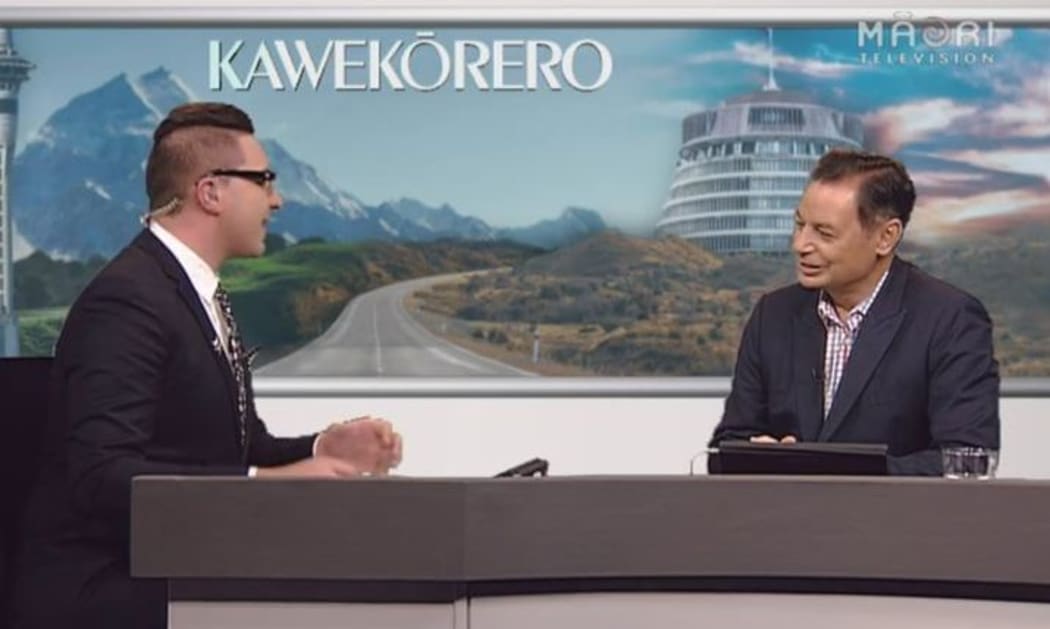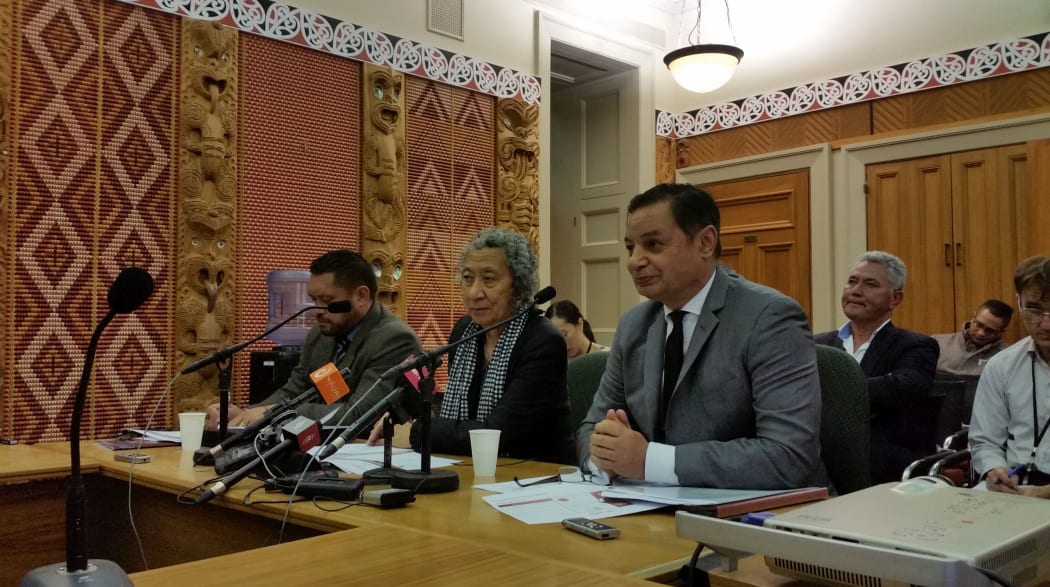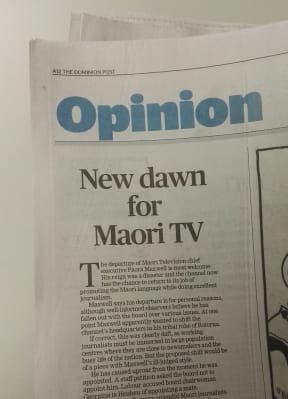This week, Māori Television’s Paora Maxwell became the latest in a series of media bosses to resign this past year. Mediawatch looks at the reaction - and why it’s not the only leadership issue currently confronting the broadcaster.

Paora Maxwell explains his decision to step down as chief executive of Maori Television to presenter Kawe Roes. Photo: screenshot / Maori Television
When Māori Television chief executive Paora Maxwell fronted up at the Māori Affairs select committee at Parliament last year, he was grilled about the turbulence at the broadcaster since he took over in 2014.
The Greens' Māori development spokesperson Marama Davidson said more than 45 people had left, including several people in key positions.
Mr Maxwell claimed the total was closer to 20 people, and said that was not unusual.
"Just look at Mediaworks. They've had a big influx and outflux," he told the committee.
It was an answer that raised eyebrows - Mediaworks had been through 18 months of turmoil in which it had haemorrhaged key talent.
Chief executive Mark Weldon had just walked away, claiming the “personal cost was too high,” with critics hammering him for gutting news and current affairs, and a TV ratings and revenue slump.
Last Monday, Paora Maxwell announced - a year later, almost to the day - that he would be stepping down from Māori Television for personal reasons.
A few days earlier TVNZ reported the relationship between Māori Television's board and Mr Maxwell was so "toxic" it had made him an offer to go.
Māori Television's impending move to south Auckland was one of the things sources said had soured the relationship between Mr Maxwell and the board and staff.
Mr Maxwell declined to be interviewed by other media this week but denied any irreconcilable differences with Māori TV's governors on the Kawe Korero show.

Paora Maxwell and board chair Georgina Te Heuheu at the Māori Affairs committee in Parliament last year. Photo: RNZ / Laura Bootham
Board chair Georgina Te Heuheu also denied any rift on Radio Waatea on Monday, but many current and former staff of MTV disputed her claim Mr Maxwell was leaving "on a high note”.
A controversial reign
He certainly did not start on a high note in 2014.
His appointment was delayed because board members couldn’t agree on it. The previous boss, Jim Mather, advised against it and the staff were reportedly almost in a state of mutiny about it.
Some even petitioned the management to appoint someone else. Board member Ian Taylor resigned over the appointment process.
MTV journalists used the Official Information Act to reveal that Ms Te Heuheu had declared a conflict of interest in Mr Maxwell's appointment, which had not been previously acknowledged. The pair were reported to be close personal friends at that time.
Mr Maxwell came to the job in the wake of an investigation on the current affairs show Native Affairs, which exposed misspending by members of the Kōhanga Reo National Trust. Some of them went to court to try to prevent the broadcast of Native Affairs.
Mr Mather backed Native Affairs, but when Paora Maxwell arrived he criticised the show's approach to the story in the New Zealand Herald.
When Mediawatch asked him what he meant, he replied:
"We have great respect for our elders and our kaumātua. There's a respectful approach and a disrespectful approach. Even when you're doing the hard talk, you need to be mindful of tone."
It was not seen as wholehearted support for the disinfectant of sunlight. Neither was the subsequent decision to reduce Native Affairs to 30 minutes.
What Mr Maxwell says that matters because he is also Māori TV’s editor in chief.
Mr Maxwell was also accused of intervening to ensure Mana Party leader Hone Harawira could not appear on Native Affairs in 2014.
When Mediawatch asked Mr Maxwell if that was true, he did not deny it.
Leadership challenges ahead

The Dominion Post applauds Paora Maxwell's decision. Photo: PHOTO / RNZ
The Dominion Post said this week the departure of Mr Maxwell was "most welcome".
"The question is whether the board of Māori Television has changed its ways or whether it will appoint someone else like Maxwell. It should grab the opportunity for change and renewal," the paper said.
But a new leader would not be the only important change in the channel’s governance. Last year, the Māori Party-backed Māori Language Act created Te Mātāwai, a new body giving iwi more say in te reo initiatives including Māori Television.
Te Mātāwai oversees the broadcasting funding agency Te Māngai Pāho and it replaced Te Pūtahi Pāho, the electoral college which oversaw Māori TV and its key appointments.
Appointments to Te Mātāwai have not been straight forward either.
Last year, Radio Waatea chief executive and broadcaster Willie Jackson was appointed to represent urban Māori, followed by Te Karere and Marae presenter Scotty Morrison.
That prompted Labour MP Peeni Henare to complain these media men could create conflicts of interest. Mr Jackson didn't agree.
“I do not believe this is a conflict of interest in the Māori world. That talk is a waste of time. Tell Peeni to focus on his own job because many people want his seat,” Mr Jackson told Māori TV.
One year later, Mr Jackson and Mr Henare are on the same team now that Willie Jackson is on Labour's list for the election.
Willie Jackson has already stood down from his two radio talk shows and plans to resign from Te Mātāwai too.
Watch these spaces for new appointments to Te Mātāwai and Māori Television. They could have a major influence on where the broadcaster goes from here.

